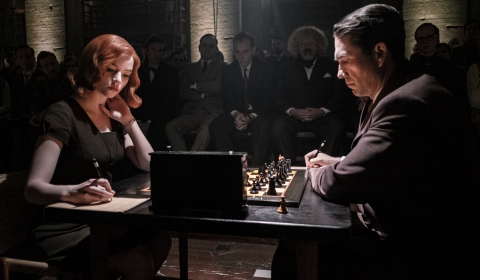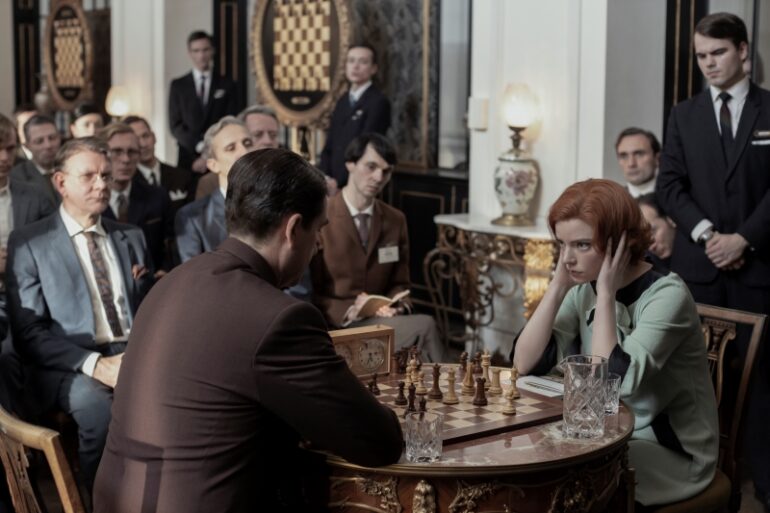Netflix’s The Queen’s Gambit is an inspiring chess story about following passions, fighting demons and not letting a chauvinistic society decide what can and can’t be done. Not only the elegant setting of 1960s America makes it worth watching.
By Silvia Vacchelli
Picture: Phil Bray/Netflix © 2020
When I was eight or nine years old my father bought a beautiful wooden chessboard and sometimes played chess with my brother during the monotonous rainy summer days we spent in our house in the mountains. I was fascinated by the shiny black and white tiles, by the carefully carved pieces, but I felt that the game was too boring and complicated for me. I remember my brother and my father staring at the board for endless minutes, but when my turn came, I was too impatient and always ended up losing, which frustrated me so I quickly lost interest in the game. Fast forward almost sixteen years later, Netflix’s new show The Queen’s Gambit managed to capture me with its dramatic storytelling and its sensual portrayal of chess so much that I ended up wondering whether I should dust off our old chessboard lying around somewhere in the basement.
The 2020 TV series, closely based on Walter Tevis’s 1983 novel of the same name and created by Scott Frank and Allan Scott, has become the most viewed series on Netflix with more than 62 million viewers during its first month of release. This coming-of-age story is ostensibly simple: It follows the life of young chess prodigy, Beth Harmon, from her days in the orphanage where she is first introduced to chess by the janitor, the grouchy Mr Shaibel, to her quest to become the world’s best chess player.
One Pawn on the Board, one Pawn in Mind
The Queen’s Gambit
USA 2020
1 season, 7 episodes
Idea: Scott Frank,Allan Scott
Starring: Anya Taylor-Joy,Bill Camp, Marielle Heller, and others
The story is set in the 1950s and 1960s in the USA and the show is able to perfectly represent the Cold War’s divergent atmosphere: its split between the consumerist American society, embodied by Beth’s passion for stylish clothes, everchanging hairstyles and accessories, and the lingering sense of fear and mistrust represented by the »Russian enemy«, the dreaded grandmaster Vasily Borgov. Especially striking is the representation of the chess matches. While it is sometimes tedious to read the description of every single move in the book, the TV series manages to keep the spectator’s attention in many creative ways: from the amazing work of the visual effects team, who created giant chess pieces moving on the ceiling to depict Beth’s mental games, to a collage of different matches which creates the visual of a chessboard.
Another strong point of the series is the acting. Both the very young actress Isla Johnston, starring as a young Beth, and her adult version portrayed by the more known Anya Taylor-Joy, are able to capture the peculiar mix of Beth’s cold, rational apathy and her sudden outbursts of anger. Moreover, Taylor-Joy, with her atypical beauty, makes Beth’s character even more mysterious and hypnotising.
Queen Checks King
The show, as well as the book , is deliberately called »The Queen’s Gambit« and not »The King’s Gambit«, which are both existing chess openings, as it focuses on its female figures. We witness the life of two generations of intelligent, talented women who struggle against the oppressive patriarchal society of the 1960s. The older generation is represented by Alice Harmon, Beth’s mother, who works as a professor of mathematics at Cornell University. Despite her brilliant intellect, she is crushed by her mental illness and the burden of being a single mother. When she realises that she is not able to take care of Beth as society would expect her to do, she tries to reach for help by contacting Beth’s father but is rejected and commits suicide. The second woman of the older generation is Alma Whitley, Beth’s adoptive mother. She is a witty woman with a passion for music and especially the piano. However, she lives all her life in the shadow of a misogynist husband who is willing to satisfy her every »whim« (such as adopting Beth) only to make her shut up. Therefore, Alma, who could have pursued her musical talent, leads a mediocre, unsatisfied life, drowning her sorrows in alcohol and tranquillizers.

If the chauvinist society clipped the wings of intelligent, potentially successful women like Alice and Alma, the new generation is willing to fight back for their rights. Jolene, Beth’s best friend, does not let her disadvantage of being an orphaned black girl bring her down, but instead manages to get a proper education to use her voice to defend black women like herself in court as a lawyer. On the other hand, Beth proves to the world that she is not special merely because she is a girl who plays chess but that she has a gift that transcends her gender. Moreover, after struggling with addiction, she learns the important lesson that being vulnerable does not make her a weak woman, but human. Society has told her that women are susceptible, emotional creatures, which lack the male rationality needed to play chess. So Beth tries to suppress her emotions by any means available to avoid a mental breakdown such as her mother’s, but it’s only when she accepts the sensitive part of herself, that she can reach her full potential as a chess player.
The series, as well as the book, is very enjoyable and encourages the spectator to reflect on still very current topics. It inspires young girls to follow their passion and not be afraid of entering a male-dominated field, such as that of chess. It teaches everyone about the importance of accepting one’s fragile side as well as seeking the help of friends and family in moments of crisis.






